新概念英语第一册Lesson131-132课课件(共32张PPT)
文档属性
| 名称 | 新概念英语第一册Lesson131-132课课件(共32张PPT) | 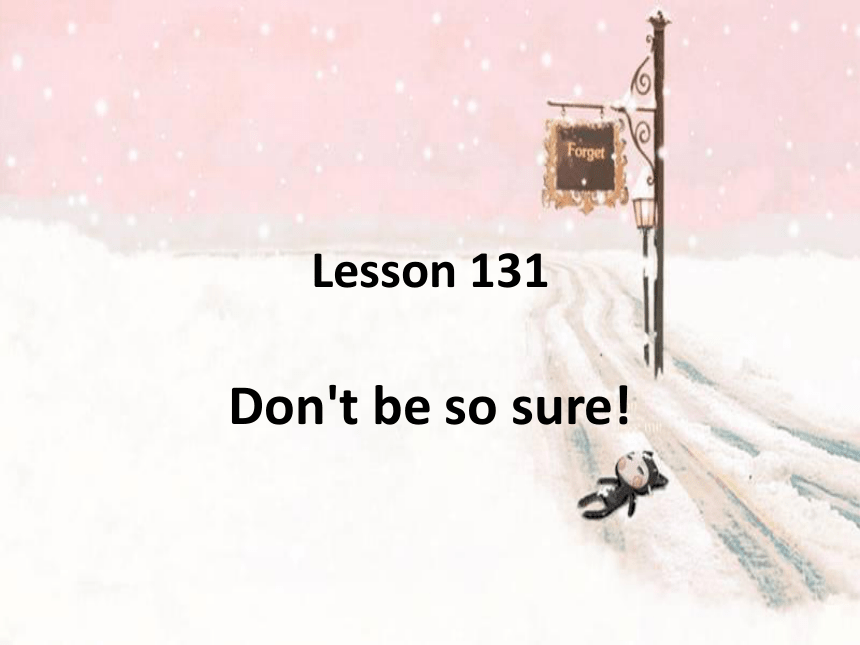 | |
| 格式 | pptx | ||
| 文件大小 | 326.7KB | ||
| 资源类型 | 教案 | ||
| 版本资源 | 新概念英语 | ||
| 科目 | 英语 | ||
| 更新时间 | 2024-04-09 09:47:18 | ||
图片预览

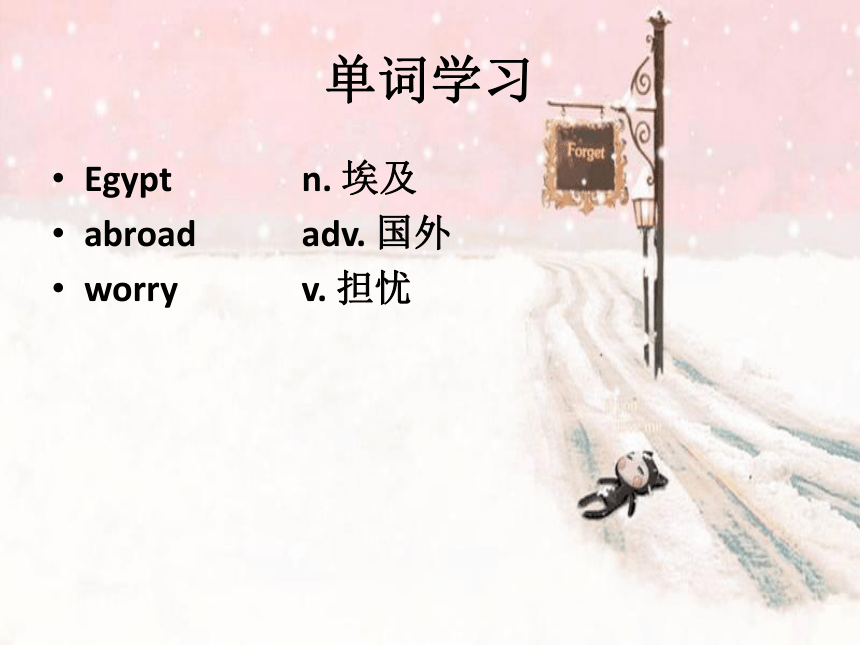
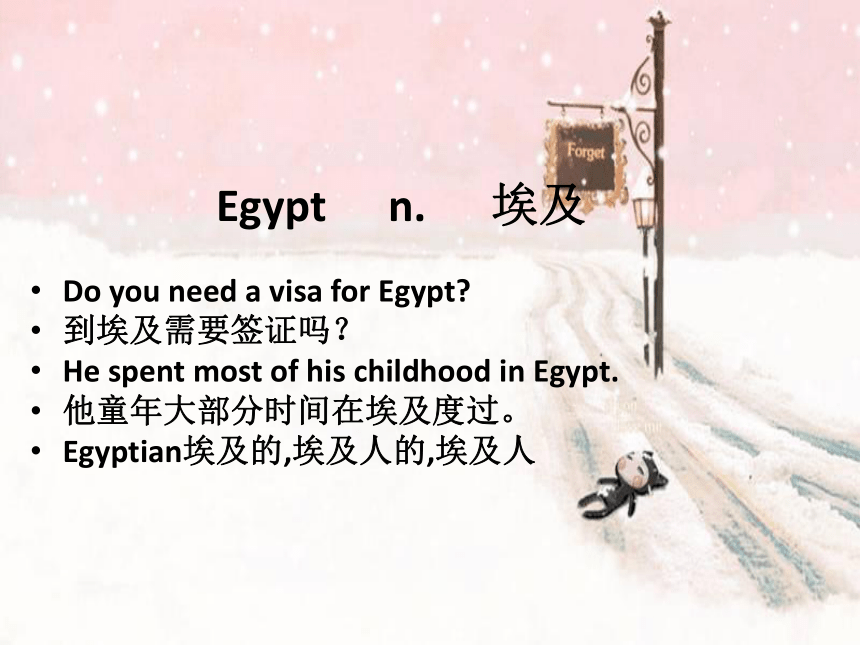
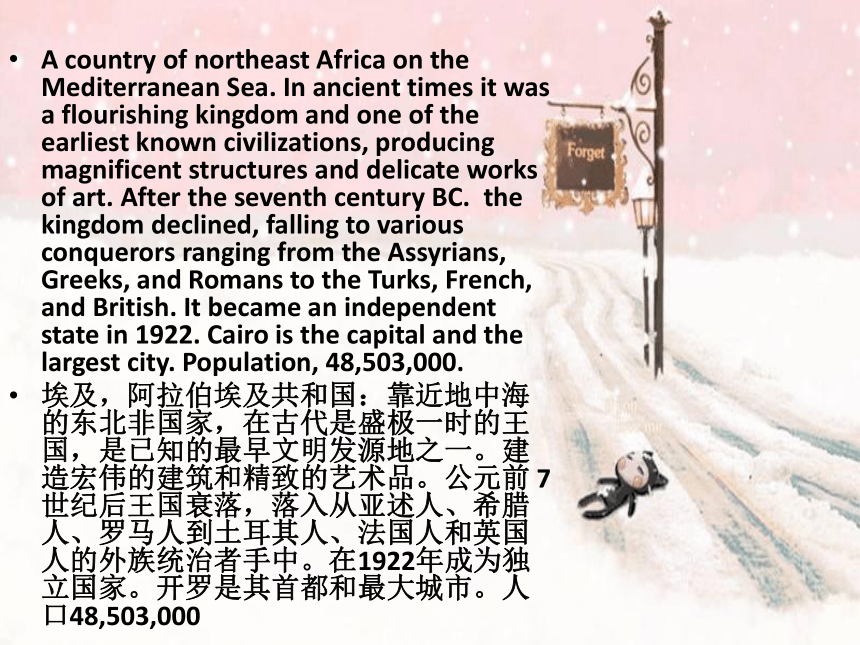




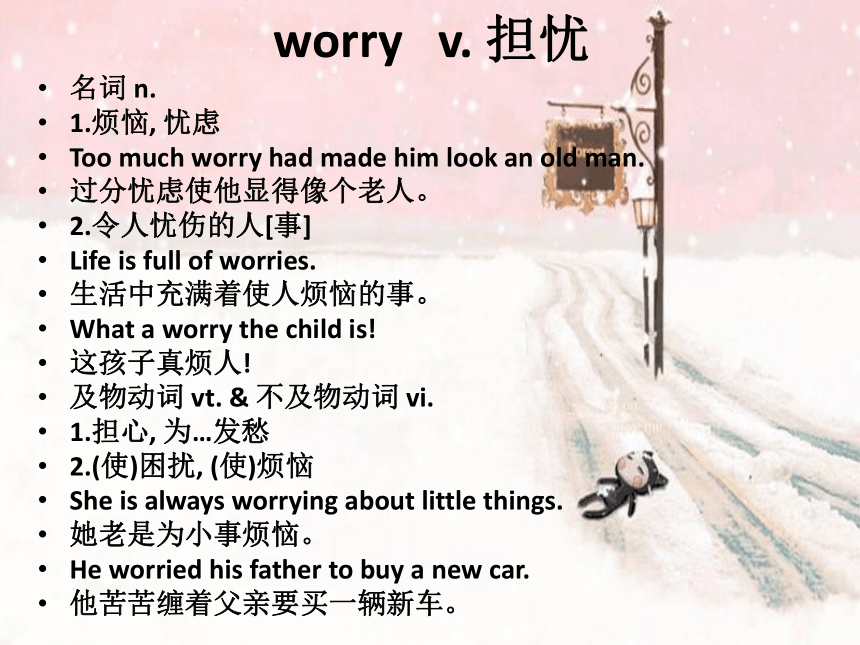
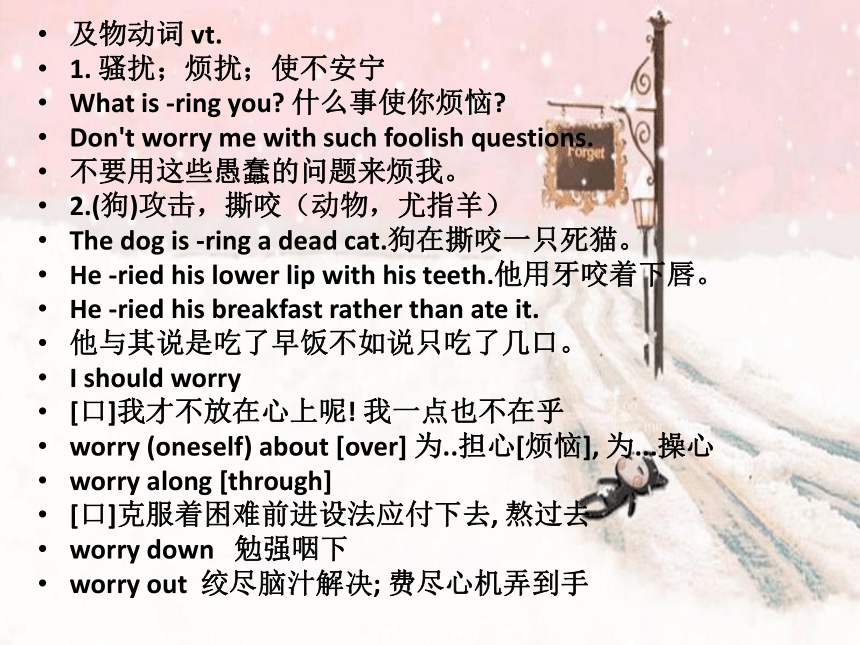
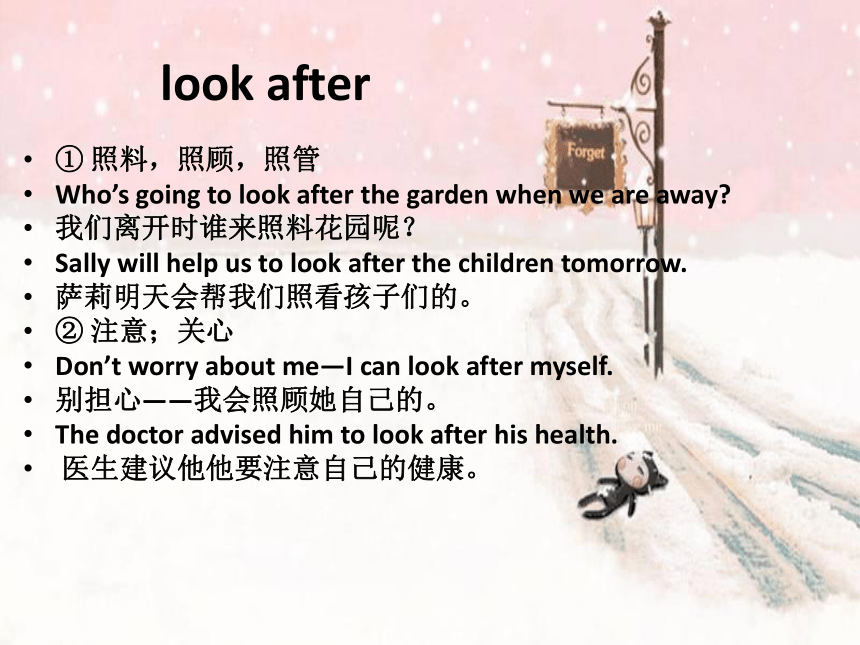
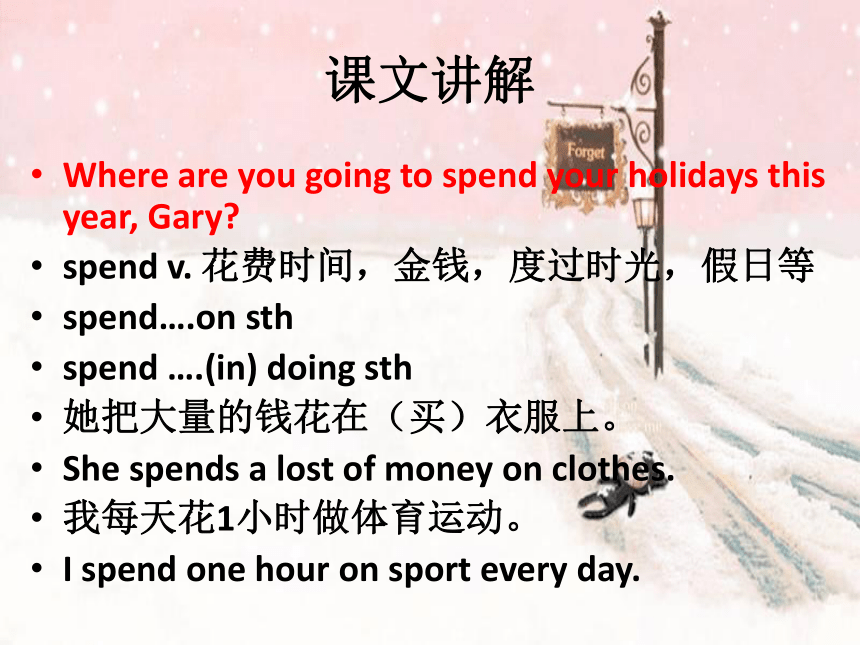
文档简介
(共32张PPT)
Lesson 131
Don't be so sure!
单词学习
Egypt n. 埃及
abroad adv. 国外
worry v. 担忧
Egypt n. 埃及
Do you need a visa for Egypt
到埃及需要签证吗?
He spent most of his childhood in Egypt.
他童年大部分时间在埃及度过。
Egyptian埃及的,埃及人的,埃及人
A country of northeast Africa on the Mediterranean Sea. In ancient times it was a flourishing kingdom and one of the earliest known civilizations, producing magnificent structures and delicate works of art. After the seventh century BC. the kingdom declined, falling to various conquerors ranging from the Assyrians, Greeks, and Romans to the Turks, French, and British. It became an independent state in 1922. Cairo is the capital and the largest city. Population, 48,503,000.
埃及,阿拉伯埃及共和国:靠近地中海的东北非国家,在古代是盛极一时的王国,是已知的最早文明发源地之一。建造宏伟的建筑和精致的艺术品。公元前 7世纪后王国衰落,落入从亚述人、希腊人、罗马人到土耳其人、法国人和英国人的外族统治者手中。在1922年成为独立国家。开罗是其首都和最大城市。人口48,503,000
abroad adv. 国外
副词 adv.
1.到国外, 在国外
All my near relations live abroad.
我所有的近亲都在国外。
2.到处, 广泛流传
The news soon spread abroad.消息迅速传开。
A rumour is abroad. 谣言在传开。
3.在户外, 在室外
The young people were still abroad at the dead of night.
这些年轻人深更半夜还在外边。
be all abroad
茫然不解, 感到莫名其妙, 离题太远, 不中肯
from abroad 从国外, 从海外
go abroad 到国外
travel abroad 到国外旅行
worry v. 担忧
名词 n.
1.烦恼, 忧虑
Too much worry had made him look an old man.
过分忧虑使他显得像个老人。
2.令人忧伤的人[事]
Life is full of worries.
生活中充满着使人烦恼的事。
What a worry the child is!
这孩子真烦人!
及物动词 vt. & 不及物动词 vi.
1.担心, 为…发愁
2.(使)困扰, (使)烦恼
She is always worrying about little things.
她老是为小事烦恼。
He worried his father to buy a new car.
他苦苦缠着父亲要买一辆新车。
及物动词 vt.
1. 骚扰;烦扰;使不安宁
What is -ring you 什么事使你烦恼
Don't worry me with such foolish questions.
不要用这些愚蠢的问题来烦我。
2.(狗)攻击,撕咬(动物,尤指羊)
The dog is -ring a dead cat.狗在撕咬一只死猫。
He -ried his lower lip with his teeth.他用牙咬着下唇。
He -ried his breakfast rather than ate it.
他与其说是吃了早饭不如说只吃了几口。
I should worry
[口]我才不放在心上呢! 我一点也不在乎
worry (oneself) about [over] 为..担心[烦恼], 为...操心
worry along [through]
[口]克服着困难前进设法应付下去, 熬过去
worry down 勉强咽下
worry out 绞尽脑汁解决; 费尽心机弄到手
look after
① 照料,照顾,照管
Who’s going to look after the garden when we are away
我们离开时谁来照料花园呢?
Sally will help us to look after the children tomorrow.
萨莉明天会帮我们照看孩子们的。
② 注意;关心
Don’t worry about me—I can look after myself.
别担心——我会照顾她自己的。
The doctor advised him to look after his health.
医生建议他他要注意自己的健康。
课文讲解
Where are you going to spend your holidays this year, Gary
spend v. 花费时间,金钱,度过时光,假日等
spend….on sth
spend ….(in) doing sth
她把大量的钱花在(买)衣服上。
She spends a lost of money on clothes.
我每天花1小时做体育运动。
I spend one hour on sport every day.
当“度过“讲时句型结构为:
spend + n.(时光,假日)+地点状语
我打算到悉尼度假。
I am going to spend my holidays in Sydney.
我在一个小城镇度过了我的童年。
I spent my childhood in a small town.
We may go abroad.
may 情态动词“可能,也许,或许“
明天也许会下雪。
It may snow tomorrow.
如果我忙的话,也许就不去了。
If I’m busy, I may not go.
I’m not sure.
be sure 肯定
be sure of/ about + n. 对…有把握
他稳操胜券
He is sure of success.
be sure that…. 肯定,确信
他确信自己会成功
He is sure that he will succeed.
be sure to do 肯定,一定,务必
一定要在5点钟给我打电话
Be sure to call me at 5 o’clock.
for sure 肯定的,有把握的
他们半个小时肯定会到。
They will be here for sure in half an hour.
make sure 查明,确定
请确定这个房子已经上锁了。
Please make sure that the house is locked.
to be sure 确定,的确,固然,后面多接but
的确,他人很不错。
To be sure, he is kind.
的确,父亲并不富有,但他是个绅士
Father isn’t rich, to be sure, but he is a gentleman.
sure (口语)“当然可以“ 相当于certainly
我能开窗吗?当然!
May I open the window
Sure!
My wife wants to go to Egypt. I’d like to go there, too. We can’t make up our minds.
would like to do sth 愿意做某事,想做某事
你想看看你的房间吗?
Would you like to have a look at your room
would like sth 想吃(喝,得到)某物
想来杯茶吗?
Would you like a cup of tea
make up one’s mind 下决心,决定
我还没打定主意。
I haven’t make up my mind yet.
Will you travel by sea or by air
选择疑问句要求答话人在两个或更多人或事物中做出选择,不能用yes 或no 作回答。
你想吃香蕉还是苹果?
Would you like some bananas or apples
我想来个苹果
I’d like an apple.
你是医生,老师还是科学家?
Are you a doctor, a teacher or a scientist
都不是,我是学生。
None of them. I am a student.
We may travel by sea. It’s cheaper, isn’t it
你是学生,不是吗?是的,我是。
You are a student, aren’t you
Yes, I am.
不,我不是。我是个牙医。
No, I’m not. I am a dentist.
你没结婚吧,结了吗?
You aren’t married, are you
Yes, I am. I married early.
不,我结婚了,我结婚比较早。
你不会乘船去吧,会吗?
You won’t travel by sea, will you
不,我要乘船去。
Yes, I’ll go by sea.
It may be cheaper, but it takes a long time.
take 花费,占用
It takes sb some time to do sth 做某事占用了某人…时间
做这件事用了我1小时的时间。
It took me 1 hour to do the job.
我花了1小时来做这项工作。
I spent one hour doing the job.
I’m sure you’ll enjoy yourselves.
enjoy oneself=have a good time 玩得愉快
寒假你玩得痛快吗?
Did you enjoy yourself during the winter vacation?
Did you have a good time during the winter vacation?
Don’t be so sure. We might not go anywhere.
might 表示非常不确定
anywhere 任何地方,副词作状语
somewhere某地,用于肯定句
nowhere 没有任何地方
我想去转转,但是因为下雨了,我哪也没去。
I wanted to go somewhere, but because of the rain, I went nowhere.
My wife always worries too much. Who's going to look after the dog Who's going to look after the house Who's going to look after the garden We have this problem every year.
look after 照看,看管
In the end, we stay at home and look after everything!
in the end 最后,到头来,说明结果
finally 最后,说明次序
at last 最后,终于(说明目的的实现)
找出文中含情态动词的句子!
We may go abroad.
We can't make up our minds.
We may travel by sea.
It may be cheaper.
We might not go anywhere.
Grammar
1. may/might表示允许和可能:
a) 允许: 询问或说明一件事可不可以做.
May I trouble you with a question
You may take this seat if you like.
He asked if he might glance through my album.
You might as well speak your mind.
(比may…显得婉转一些)
b) 可能: 表示一件事或许发生(或是某种情况可能会存在).
You may walk ten miles without seeing a house.
She was afraid they might not like the idea.
A bad thing might be turned to good account.
c) might 表示请求:
Might I ask for a photograph of your baby
(比May I …更客气一些)
2. can’t, couldn’t表示否定的推测:
She can’t be serious.
A more suitable book can’t be found. (It is not possible to find a more suitable book.)
He couldn’t (can’t) be over fifty.
3. should, ought to: 表示应该做的事, ought to比should口气稍重一些.
You should (ought to) do as he says.
You shouldn’t (oughtn’t to) talk like that.
但这两者间也有一些差别, 在表示责任, 义务等该做的事情时, 常用ought to, 在表示某件事宜于做时, 多用should, 在下面的句子中这两个词就不宜换用:
You are his father. You ought to take care of him.
We should not use too many big words in our everyday speech.
从A、B、C、D四个选项中,选出最佳选项。
— Someone is knocking at the door.
— Who ______ it be at this hour of day
A. may B. can
C. must D. should
4. will, would
5. shall, should表示意愿
6. 情态动词后接进行式, 完成式和完成进行式:
a) 情态动词可以和动词的进行式构成谓语, 表示”应该正在…”, “想必正在…”这类意思:
Why should we be sitting here doing nothing
This isn’t what I ought to be doing.
She might still be thinking about the question you raised.
They must (may) be waiting for us, let’s hurry up.
They can’t be using the room now.
b) 情态动词有时和动词的完成形式构成谓语, 表示”应当已经…”, “想必已经…”这类意思:
I should have thought of that.
They shouldn’t have left so soon.
She must have arrived by now.
You needn’t have told them that.
Where can (could) he have gone
He can’t have finished the work so soon.
He may not have achieved all his aims. But his effort is praise-worthy.
We ought to have give you more help.
c) 情态动词间或也可以和一个动词的完成进行式构成谓语,表示”应当一直在…”, “想必一直在…”这类意思:
They are sweating all over. They must have been working in the fields.
They may have been discussing the problem this morning.
You should have been waiting for us. Why haven’t you
She couldn’t have been swimming all day.
Homework
1. To finish the exercises after the text.
2. To practise the structures learned during the class.
Lesson 131
Don't be so sure!
单词学习
Egypt n. 埃及
abroad adv. 国外
worry v. 担忧
Egypt n. 埃及
Do you need a visa for Egypt
到埃及需要签证吗?
He spent most of his childhood in Egypt.
他童年大部分时间在埃及度过。
Egyptian埃及的,埃及人的,埃及人
A country of northeast Africa on the Mediterranean Sea. In ancient times it was a flourishing kingdom and one of the earliest known civilizations, producing magnificent structures and delicate works of art. After the seventh century BC. the kingdom declined, falling to various conquerors ranging from the Assyrians, Greeks, and Romans to the Turks, French, and British. It became an independent state in 1922. Cairo is the capital and the largest city. Population, 48,503,000.
埃及,阿拉伯埃及共和国:靠近地中海的东北非国家,在古代是盛极一时的王国,是已知的最早文明发源地之一。建造宏伟的建筑和精致的艺术品。公元前 7世纪后王国衰落,落入从亚述人、希腊人、罗马人到土耳其人、法国人和英国人的外族统治者手中。在1922年成为独立国家。开罗是其首都和最大城市。人口48,503,000
abroad adv. 国外
副词 adv.
1.到国外, 在国外
All my near relations live abroad.
我所有的近亲都在国外。
2.到处, 广泛流传
The news soon spread abroad.消息迅速传开。
A rumour is abroad. 谣言在传开。
3.在户外, 在室外
The young people were still abroad at the dead of night.
这些年轻人深更半夜还在外边。
be all abroad
茫然不解, 感到莫名其妙, 离题太远, 不中肯
from abroad 从国外, 从海外
go abroad 到国外
travel abroad 到国外旅行
worry v. 担忧
名词 n.
1.烦恼, 忧虑
Too much worry had made him look an old man.
过分忧虑使他显得像个老人。
2.令人忧伤的人[事]
Life is full of worries.
生活中充满着使人烦恼的事。
What a worry the child is!
这孩子真烦人!
及物动词 vt. & 不及物动词 vi.
1.担心, 为…发愁
2.(使)困扰, (使)烦恼
She is always worrying about little things.
她老是为小事烦恼。
He worried his father to buy a new car.
他苦苦缠着父亲要买一辆新车。
及物动词 vt.
1. 骚扰;烦扰;使不安宁
What is -ring you 什么事使你烦恼
Don't worry me with such foolish questions.
不要用这些愚蠢的问题来烦我。
2.(狗)攻击,撕咬(动物,尤指羊)
The dog is -ring a dead cat.狗在撕咬一只死猫。
He -ried his lower lip with his teeth.他用牙咬着下唇。
He -ried his breakfast rather than ate it.
他与其说是吃了早饭不如说只吃了几口。
I should worry
[口]我才不放在心上呢! 我一点也不在乎
worry (oneself) about [over] 为..担心[烦恼], 为...操心
worry along [through]
[口]克服着困难前进设法应付下去, 熬过去
worry down 勉强咽下
worry out 绞尽脑汁解决; 费尽心机弄到手
look after
① 照料,照顾,照管
Who’s going to look after the garden when we are away
我们离开时谁来照料花园呢?
Sally will help us to look after the children tomorrow.
萨莉明天会帮我们照看孩子们的。
② 注意;关心
Don’t worry about me—I can look after myself.
别担心——我会照顾她自己的。
The doctor advised him to look after his health.
医生建议他他要注意自己的健康。
课文讲解
Where are you going to spend your holidays this year, Gary
spend v. 花费时间,金钱,度过时光,假日等
spend….on sth
spend ….(in) doing sth
她把大量的钱花在(买)衣服上。
She spends a lost of money on clothes.
我每天花1小时做体育运动。
I spend one hour on sport every day.
当“度过“讲时句型结构为:
spend + n.(时光,假日)+地点状语
我打算到悉尼度假。
I am going to spend my holidays in Sydney.
我在一个小城镇度过了我的童年。
I spent my childhood in a small town.
We may go abroad.
may 情态动词“可能,也许,或许“
明天也许会下雪。
It may snow tomorrow.
如果我忙的话,也许就不去了。
If I’m busy, I may not go.
I’m not sure.
be sure 肯定
be sure of/ about + n. 对…有把握
他稳操胜券
He is sure of success.
be sure that…. 肯定,确信
他确信自己会成功
He is sure that he will succeed.
be sure to do 肯定,一定,务必
一定要在5点钟给我打电话
Be sure to call me at 5 o’clock.
for sure 肯定的,有把握的
他们半个小时肯定会到。
They will be here for sure in half an hour.
make sure 查明,确定
请确定这个房子已经上锁了。
Please make sure that the house is locked.
to be sure 确定,的确,固然,后面多接but
的确,他人很不错。
To be sure, he is kind.
的确,父亲并不富有,但他是个绅士
Father isn’t rich, to be sure, but he is a gentleman.
sure (口语)“当然可以“ 相当于certainly
我能开窗吗?当然!
May I open the window
Sure!
My wife wants to go to Egypt. I’d like to go there, too. We can’t make up our minds.
would like to do sth 愿意做某事,想做某事
你想看看你的房间吗?
Would you like to have a look at your room
would like sth 想吃(喝,得到)某物
想来杯茶吗?
Would you like a cup of tea
make up one’s mind 下决心,决定
我还没打定主意。
I haven’t make up my mind yet.
Will you travel by sea or by air
选择疑问句要求答话人在两个或更多人或事物中做出选择,不能用yes 或no 作回答。
你想吃香蕉还是苹果?
Would you like some bananas or apples
我想来个苹果
I’d like an apple.
你是医生,老师还是科学家?
Are you a doctor, a teacher or a scientist
都不是,我是学生。
None of them. I am a student.
We may travel by sea. It’s cheaper, isn’t it
你是学生,不是吗?是的,我是。
You are a student, aren’t you
Yes, I am.
不,我不是。我是个牙医。
No, I’m not. I am a dentist.
你没结婚吧,结了吗?
You aren’t married, are you
Yes, I am. I married early.
不,我结婚了,我结婚比较早。
你不会乘船去吧,会吗?
You won’t travel by sea, will you
不,我要乘船去。
Yes, I’ll go by sea.
It may be cheaper, but it takes a long time.
take 花费,占用
It takes sb some time to do sth 做某事占用了某人…时间
做这件事用了我1小时的时间。
It took me 1 hour to do the job.
我花了1小时来做这项工作。
I spent one hour doing the job.
I’m sure you’ll enjoy yourselves.
enjoy oneself=have a good time 玩得愉快
寒假你玩得痛快吗?
Did you enjoy yourself during the winter vacation?
Did you have a good time during the winter vacation?
Don’t be so sure. We might not go anywhere.
might 表示非常不确定
anywhere 任何地方,副词作状语
somewhere某地,用于肯定句
nowhere 没有任何地方
我想去转转,但是因为下雨了,我哪也没去。
I wanted to go somewhere, but because of the rain, I went nowhere.
My wife always worries too much. Who's going to look after the dog Who's going to look after the house Who's going to look after the garden We have this problem every year.
look after 照看,看管
In the end, we stay at home and look after everything!
in the end 最后,到头来,说明结果
finally 最后,说明次序
at last 最后,终于(说明目的的实现)
找出文中含情态动词的句子!
We may go abroad.
We can't make up our minds.
We may travel by sea.
It may be cheaper.
We might not go anywhere.
Grammar
1. may/might表示允许和可能:
a) 允许: 询问或说明一件事可不可以做.
May I trouble you with a question
You may take this seat if you like.
He asked if he might glance through my album.
You might as well speak your mind.
(比may…显得婉转一些)
b) 可能: 表示一件事或许发生(或是某种情况可能会存在).
You may walk ten miles without seeing a house.
She was afraid they might not like the idea.
A bad thing might be turned to good account.
c) might 表示请求:
Might I ask for a photograph of your baby
(比May I …更客气一些)
2. can’t, couldn’t表示否定的推测:
She can’t be serious.
A more suitable book can’t be found. (It is not possible to find a more suitable book.)
He couldn’t (can’t) be over fifty.
3. should, ought to: 表示应该做的事, ought to比should口气稍重一些.
You should (ought to) do as he says.
You shouldn’t (oughtn’t to) talk like that.
但这两者间也有一些差别, 在表示责任, 义务等该做的事情时, 常用ought to, 在表示某件事宜于做时, 多用should, 在下面的句子中这两个词就不宜换用:
You are his father. You ought to take care of him.
We should not use too many big words in our everyday speech.
从A、B、C、D四个选项中,选出最佳选项。
— Someone is knocking at the door.
— Who ______ it be at this hour of day
A. may B. can
C. must D. should
4. will, would
5. shall, should表示意愿
6. 情态动词后接进行式, 完成式和完成进行式:
a) 情态动词可以和动词的进行式构成谓语, 表示”应该正在…”, “想必正在…”这类意思:
Why should we be sitting here doing nothing
This isn’t what I ought to be doing.
She might still be thinking about the question you raised.
They must (may) be waiting for us, let’s hurry up.
They can’t be using the room now.
b) 情态动词有时和动词的完成形式构成谓语, 表示”应当已经…”, “想必已经…”这类意思:
I should have thought of that.
They shouldn’t have left so soon.
She must have arrived by now.
You needn’t have told them that.
Where can (could) he have gone
He can’t have finished the work so soon.
He may not have achieved all his aims. But his effort is praise-worthy.
We ought to have give you more help.
c) 情态动词间或也可以和一个动词的完成进行式构成谓语,表示”应当一直在…”, “想必一直在…”这类意思:
They are sweating all over. They must have been working in the fields.
They may have been discussing the problem this morning.
You should have been waiting for us. Why haven’t you
She couldn’t have been swimming all day.
Homework
1. To finish the exercises after the text.
2. To practise the structures learned during the class.
同课章节目录
